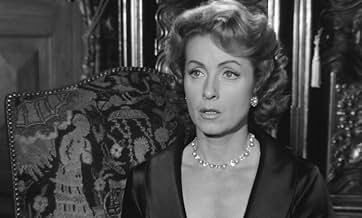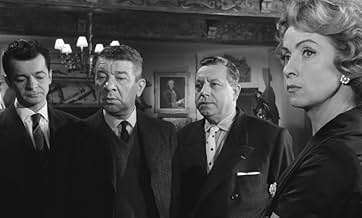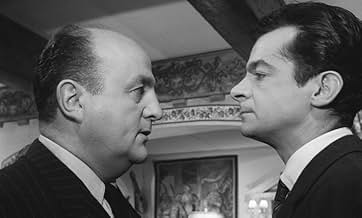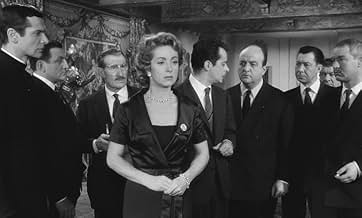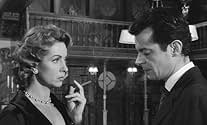AVALIAÇÃO DA IMDb
7,5/10
1,5 mil
SUA AVALIAÇÃO
Adicionar um enredo no seu idiomaFifteen years after WWII, a group of ex-resistance fighters are brought together by Marie-Octobre, so that the former members of the network can finally relive one fateful night and find out... Ler tudoFifteen years after WWII, a group of ex-resistance fighters are brought together by Marie-Octobre, so that the former members of the network can finally relive one fateful night and find out who betrayed their murdered leader, Castille.Fifteen years after WWII, a group of ex-resistance fighters are brought together by Marie-Octobre, so that the former members of the network can finally relive one fateful night and find out who betrayed their murdered leader, Castille.
- Direção
- Roteiristas
- Artistas
René Brejot
- Self - Wrestling Referee
- (não creditado)
Roger Delaporte
- Self - Wrestling Match on TV
- (não creditado)
Iska Khan
- Self - Wrestling Match on TV
- (não creditado)
King Kong Taverne
- Self - Wrestling Match on TV
- (não creditado)
Paul Villard
- Self - Wrestling Match on TV
- (não creditado)
Avaliações em destaque
Duvivier seems capable like no other of really laying out the most unpalatable truths. The movie shows a group of resistance fighters assemble for a reunion 15 years after the war is over. It's genre is whodunnit (who betrayed our leader in this case), but it's a lot more impressive than that suggests. What the structure does do is allow for a lot of suspense, the movie really kept me fascinated.
Right from the start nothing appears particularly heroic about the group, their meet up is as awkward as an SS reunion. After the war they all went their separate ways pretty much (with exceptions, such as Marie-Octobre and Francois, the rich industrialist who funds her fashion house). Why is this important. It feels like they maybe did dirty things together, took justice into their own hands, skulked around in the shadows. Maybe their cause justifies everything, I guess that would be the traditional view anyway. I'm in my mid thirties and I never met anyone who believed in a cause, people choose activities and roles that suit them, that is all, killing as an activity is much more fundamental than the cause it underlies.
There is something extremely unhealthy about the male "comrades" and their attitude to Marie-Octobre. At the beginning Francois introduces her as "notre fleur de fusil", or the rose in our guns. Her role generally seems to be "unattainable sex object". She refers to the gathering at one point as a "huis clos", a term for a closed proceedings, but surely meant to evoke Sartre's play ("No Exit" in English), about the pain of being aware of yourself an an object to others' perception, set in Hell. I refer to them as comrades in inverted commas because they are all quite ready to suspect one another at the drop of a hat. In a particularly galling act of cowardice they all write down the name of the person they prejudge as being guilty and anonymously drop their ballots into an urn.
No new truths are discovered in the course of the meeting, these are all people who know one another, all they have to do is work out, in a rather anally retentive fashion how each individual's proclivities could have lead to the death of their leader.
I personally found the elegant and aristocratic Francois almost intolerably overbearing and sanctimonious. His view of order must be imposed on everyone else. I never felt more in favour of anarchy than when watching this movie.
Right from the start nothing appears particularly heroic about the group, their meet up is as awkward as an SS reunion. After the war they all went their separate ways pretty much (with exceptions, such as Marie-Octobre and Francois, the rich industrialist who funds her fashion house). Why is this important. It feels like they maybe did dirty things together, took justice into their own hands, skulked around in the shadows. Maybe their cause justifies everything, I guess that would be the traditional view anyway. I'm in my mid thirties and I never met anyone who believed in a cause, people choose activities and roles that suit them, that is all, killing as an activity is much more fundamental than the cause it underlies.
There is something extremely unhealthy about the male "comrades" and their attitude to Marie-Octobre. At the beginning Francois introduces her as "notre fleur de fusil", or the rose in our guns. Her role generally seems to be "unattainable sex object". She refers to the gathering at one point as a "huis clos", a term for a closed proceedings, but surely meant to evoke Sartre's play ("No Exit" in English), about the pain of being aware of yourself an an object to others' perception, set in Hell. I refer to them as comrades in inverted commas because they are all quite ready to suspect one another at the drop of a hat. In a particularly galling act of cowardice they all write down the name of the person they prejudge as being guilty and anonymously drop their ballots into an urn.
No new truths are discovered in the course of the meeting, these are all people who know one another, all they have to do is work out, in a rather anally retentive fashion how each individual's proclivities could have lead to the death of their leader.
I personally found the elegant and aristocratic Francois almost intolerably overbearing and sanctimonious. His view of order must be imposed on everyone else. I never felt more in favour of anarchy than when watching this movie.
At first sight, a policier. Or adaptation of Agatha Christie novel. Or only a war story. Or a story of revenge.
But each of this definitions works in some measure. It is a film admirable crafted and this represents one of its basic virtues. The second good point, obvious , the cast. Not the last, the atmosphere, constructed crumb by crumb.
After fifteen years , a sort of trial . The members of resistance group looking for the author of murder of one of them. Danielle Darrieux is just superb, proposing a great character in wich past love remains part of desire, cold one, of justice.
A film captivating the viewer as testimony of this special hunt of truth, in which the accusations, doubts, excuses are mixed in a large effort to cure a stain of past.
But each of this definitions works in some measure. It is a film admirable crafted and this represents one of its basic virtues. The second good point, obvious , the cast. Not the last, the atmosphere, constructed crumb by crumb.
After fifteen years , a sort of trial . The members of resistance group looking for the author of murder of one of them. Danielle Darrieux is just superb, proposing a great character in wich past love remains part of desire, cold one, of justice.
A film captivating the viewer as testimony of this special hunt of truth, in which the accusations, doubts, excuses are mixed in a large effort to cure a stain of past.
The plot of Jacques Robert's novel 'Marie-Octobre' of 1948 and Michael McCarthy's film 'The Traitor' from 1957 are too alike to be coincidental but there the similarity ends for when Robert adapted his work for the screen he had the services of one of the greatest directors Julien Duvivier, the superlative dialogue writer Henri Jeanson and a cast comprising some of France's finest.
The subject matter could not fail to strike a chord with Gallic audiences, dealing as it does with treachery and collaborationism during the German occupation. It also works as mystery thriller as suspicion falls upon each of the protagonists in turn until the traitor is finally unmasked. The question then arises as to the method of punishment......
Filmed in three weeks on a single set designed by Georges Wakhévitch and observing the Aristotelian unities of time, place and action, this could easily be filmed theatre but becomes much more thanks to the masterly manner in which the director moves and groups his players and the clever camerawork of Robert Lefebvre. Apparently it was shot in sequence so that none of the actors knew the identity of the culprit and what actors they are! Each possessing an unique persona but delivering ensemble playing of the highest order.
The only negatives are the sudden bursts of music at certain dramatic moments and the truly laughable sub-titling.
The post-war films of Monsieur Duvivier are variable but he remains one of the Big Five of France's Golden Age. He departed this life in 1967 and this finely executed, technically polished piece is arguably his dernier hourra.
The subject matter could not fail to strike a chord with Gallic audiences, dealing as it does with treachery and collaborationism during the German occupation. It also works as mystery thriller as suspicion falls upon each of the protagonists in turn until the traitor is finally unmasked. The question then arises as to the method of punishment......
Filmed in three weeks on a single set designed by Georges Wakhévitch and observing the Aristotelian unities of time, place and action, this could easily be filmed theatre but becomes much more thanks to the masterly manner in which the director moves and groups his players and the clever camerawork of Robert Lefebvre. Apparently it was shot in sequence so that none of the actors knew the identity of the culprit and what actors they are! Each possessing an unique persona but delivering ensemble playing of the highest order.
The only negatives are the sudden bursts of music at certain dramatic moments and the truly laughable sub-titling.
The post-war films of Monsieur Duvivier are variable but he remains one of the Big Five of France's Golden Age. He departed this life in 1967 and this finely executed, technically polished piece is arguably his dernier hourra.
This movie is more like a theater-play: very much talking and hardly any action. All talking is done in French, and deals with a very haunting issue: in 1959 a former French resistance group reunites to search themselves for a traitor who killed one of them back in 1944. In this way a real Agatha Christie-like plot develops, all set in the long dark shadows of World War II and its horrors. Leading female star Danielle Darrieux gives a glittering performance, both in her talking and in her presence. The male cast around her consists of some of the greatest French actors at the time. 'Marie-Octobre' is not an easy movie to watch: you have to concentrate on it. If you do so, you'll be swept along onto its climax and surprising end.
What struck me most about Julien Duvivier's MARIE-OCTOBRE, an Agatha Christie-style mystery about a former resistance leader (Danielle Darrieux) who gathers her old cohorts together to flush out the Judas who betrayed them, was how the plot was set in motion. Fifteen years after the war, Marie runs a fashion house and a German buyer, a former Wehrmacht officer, recognized her and let it slip in casual conversation that one of her own had turned them in back in the day -only he couldn't remember their name. Former enemies striking up an acquaintance many years later and reminiscing about the war "like old friends" doubtless happened to many a Yank and British vet on Continental vacations back in the '50s and '60s but in this instance that betrayal caused the death of Marie's lover. She never married, never forgot, and her insistence on a day of reckoning stood in stark contrast to the near-indifference most of the others exhibited (there was one suspect who kept sneaking away from the investigation to watch wrestling on TV). They all had gotten on with their lives and preferred to let the past stay buried, even a priest.
It's a good idea with an obvious flaw, unfortunately -the entire film takes place in a drawing room and is all talk, talk, talk. MARIE-OCTOBRE positively cries out for flashbacks and if it had only "opened up", it could have been impressive, indeed, and would most likely be much better known today. Still, the movie's got a great "name" cast and the tale itself is quite involving. Recommended.
It's a good idea with an obvious flaw, unfortunately -the entire film takes place in a drawing room and is all talk, talk, talk. MARIE-OCTOBRE positively cries out for flashbacks and if it had only "opened up", it could have been impressive, indeed, and would most likely be much better known today. Still, the movie's got a great "name" cast and the tale itself is quite involving. Recommended.
Você sabia?
- CuriosidadesFrench visa # 21312.
- ConexõesFeatured in Danielle Darrieux: Il est poli d'être gai! (2019)
Principais escolhas
Faça login para avaliar e ver a lista de recomendações personalizadas
- How long is Marie-Octobre?Fornecido pela Alexa
Detalhes
- Tempo de duração1 hora 30 minutos
- Cor
- Proporção
- 1.66 : 1
Contribua para esta página
Sugerir uma alteração ou adicionar conteúdo ausente


![Assistir a Bande-annonce [OV]](https://m.media-amazon.com/images/M/MV5BZmM2Y2Q3NmEtM2E2Yi00MWY5LTlmZjEtMDUzYjc3MDQ0YzRiXkEyXkFqcGdeQXRyYW5zY29kZS13b3JrZmxvdw@@._V1_QL75_UX500_CR0)
